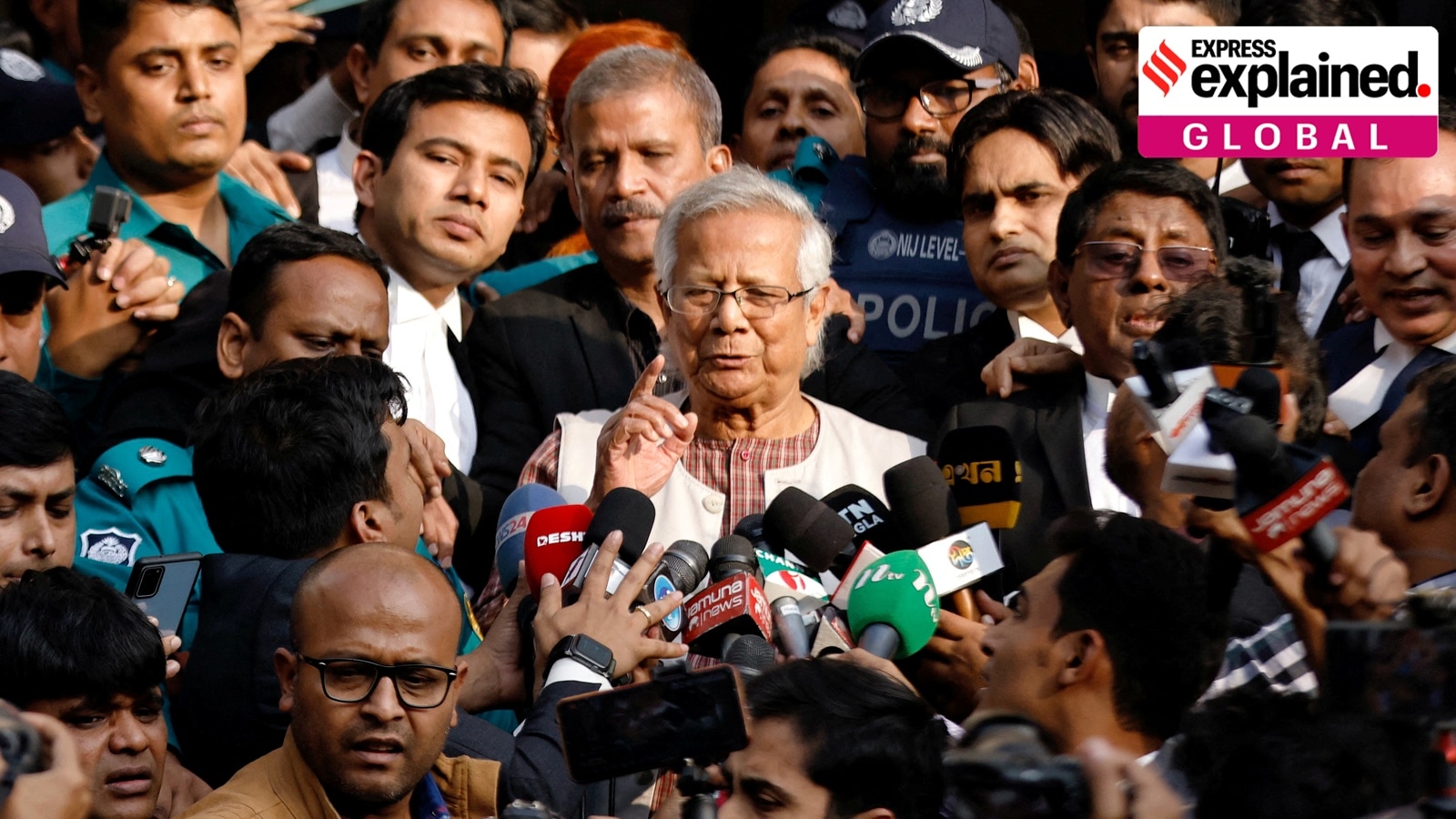Why a Bangladesh court has sentenced Nobel prize winner Muhammad Yunus to jail
Muhammad Yunus, known as 'Banker to the Poor', won the Nobel prize in 2006. On Monday, he was convicted of violating Bangladesh's labour laws and sentenced to 6 months in jail. Notably, Yunus shares a frosty relationship with PM Sheikh Hasina.
 Bangladeshi Nobel peace laureate Professor Muhammad Yunus gestures in front of the court after being sentenced to six months of imprisonment and fined BDT 5,000 in a labour law violation case, in Dhaka, Bangladesh, January 1, 2024. (Reuters/Mohammad Ponir Hossain)
Bangladeshi Nobel peace laureate Professor Muhammad Yunus gestures in front of the court after being sentenced to six months of imprisonment and fined BDT 5,000 in a labour law violation case, in Dhaka, Bangladesh, January 1, 2024. (Reuters/Mohammad Ponir Hossain)Nobel prize winner Muhammad Yunus on Monday (January 1) was sentenced to six months in jail by a court in Bangladesh for violating the country’s labour laws. The 83-year-old, credited with pioneering the system of micro-finance loans to help impoverished people, was granted bail pending appeal.
While Yunus called the judgement “contrary to all legal precedent and logic”, his supporters said the case was politically motivated. The professor shares a frosty relationship with Bangladesh’s Prime Minister Sheikh Hasina, who once accused him of “sucking blood” from the poor.
Currently, Yunus is facing a wide array of other charges involving alleged corruption and fund embezzlement.
Who is Muhammad Yunus?
Born in 1940 in Chittagong, Yunus received his PhD in economics from Vanderbilt University in Tennessee, USA, in 1969 and subsequently, became an assistant professor at Middle Tennessee State University. After Bangladesh was formed in 1972, he returned to his homeland and was appointed head of the economics department at Chittagong University.
As Bangladesh struggled to stabilise its economy and tackle poverty in the post-independence years, Yunus came up with a unique idea to help the impoverished. He decided to provide small loans to entrepreneurs who wouldn’t normally qualify for bank loans, on terms suitable to them.
“Following the success of an initial local experiment, Professor Yunus became confident that the model could work on a broader scale and went to set up microcredit projects in other parts of the country. Within seven years, the initiative took formal shape as the Grameen Bank in 1983,” says an African Development Bank Group profile of him.
Grameen Bank is credited with lifting millions from poverty — it has disbursed collateral-free loans of $34.01 billion among 9.55 million people since its inception, Daily Sun, a Bangladesh-based national daily, reported last year. The recovery rate is 97.22%, the report added.
Owing to the grand success of Grameen Bank, banks based on this model operate in more than 100 countries today.
In 2006, Yunus and Grameen Bank jointly received the Nobel Prize in Peace “for their efforts to create economic and social development from below.” The professor came to be known as the “Banker to the Poor”.
Why does Yunus share a tumultuous relationship with Sheikh Hasina?
Soon after winning the Nobel Prize, Yunus began to flirt with the idea of forming his own political party. This didn’t sit well with Hasina, who was in jail at the time under the charges of extortion.
In the following months, Yunus abandoned his plans, saying there wasn’t enough support for his new political movement. Nonetheless, once Hasina returned to power in 2009, her government opened a host of investigations into Yunus’ activities. The prime minister accused him of using force and other means to recover loans from poor rural women as the head of Grameen Bank.
Why has Yunus been sentenced to jail?
The Third Court of Dhaka on Monday found Yunus’ company, Grameen Telecom, which he founded as a non-profit, guilty of violating labour laws. According to the judgement, 67 of the company employees were supposed to be made permanent, which they were not, and the employees’ participation and welfare funds were not created. Moreover, as per company policy, 5% of the company’s dividends were supposed to be distributed to staff, which was not done.
The court convicted Yunus, as chairman of Grameen Telecom, and three other company directors, sentencing each to six months in jail. Grameen Telecom owns 34% of Bangladesh’s largest mobile phone company, Grameenphone, a subsidiary of Norway’s telecom giant Telenor, according to a report by Associated Press.
What are the other cases against Yunus?
Yunus is said to be facing more than 150 cases. In 2015, he was summoned by Bangladesh’s revenue authorities over non-payment of taxes amounting to $1.51 million. Two years before that, he was put on trial for allegedly receiving money without government permission, including his Nobel Prize award and royalties from a book.
In 2011, Yunus was removed as managing director of Grameen Bank for allegedly violating government retirement regulations.
The mounting litany of cases against Yunus has garnered concern globally. In August last year, 160 international figures, including former US President Barack Obama and ex-UN Secretary-General Ban Ki-moon, signed a joint letter denouncing the “continuous judicial harassment” of Yunus.
The signatories, including more than 100 of his fellow Nobel laureates, said they feared for “his safety and freedom”.
In response, Hasina said she welcomed international experts to assess the ongoing legal proceedings against Yunus.
- 01
- 02
- 03
- 04
- 05






































